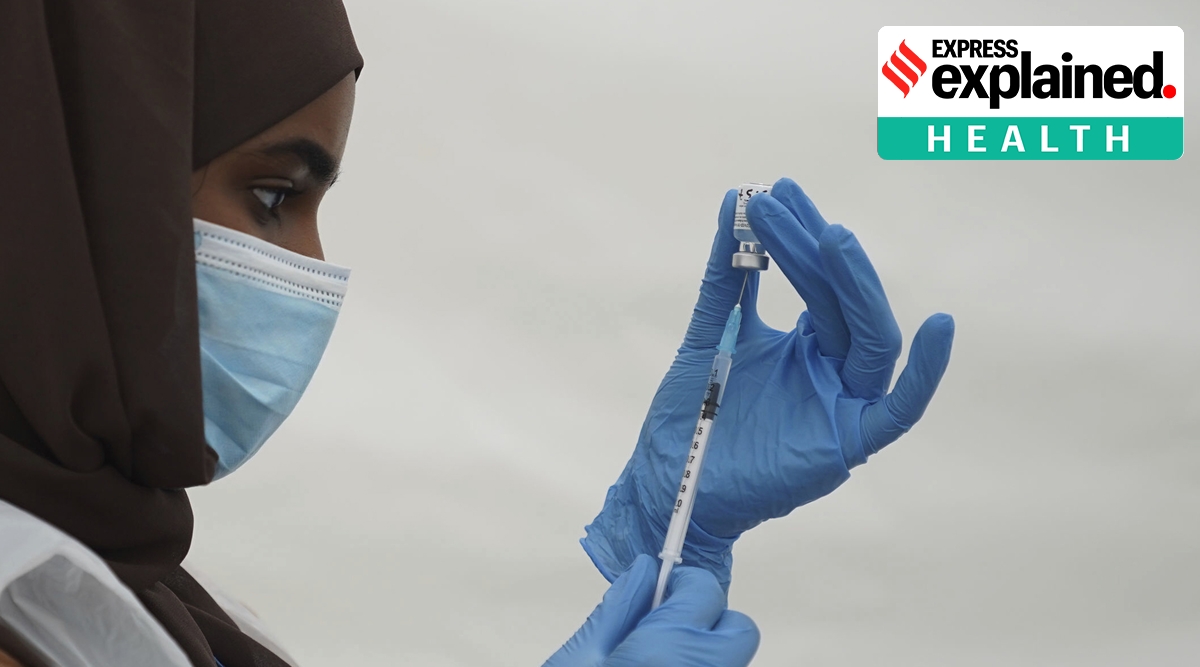Explained: Covid-19 vaccinations and incentives in the UK
As of July 31, 88.6 per cent of people above the age of 18 have taken the first dose and 72.1 per cent of people in the same age group have taken the second dose in the country.

With more than 85 million Covid-19 vaccine doses administered in the UK, the country is now offering an array of incentives to encourage people to get the vaccine. Countries across the world are strengthening the vaccine push, with people eager to go back to living their pre-pandemic lives.
According to a UK government statement, leading businesses in the country have joined a national effort to further drive uptake in young people. Among these businesses, Uber, Bolt and Deliveroo are offering incentives to people to get vaccinated. Pizza outlet Pizza Pilgrims along with the other businesses will offer discounts and incentives to customers who will get the vaccines.
Newsletter | Click to get the day’s best explainers in your inbox
Why incentives are required
The UK is not alone, countries including Serbia, Israel, Italy and different states in the US have been offering incentives to override vaccine scepticism. According to The Economist, at least in the US, hesitancy towards the vaccine is underpinned by poor health literacy and not just divisive politics, which also plays a role in convincing some people that getting vaccinated against COVID-19 is not the best decision for themselves.
The Associated Press reported that in Paris thousands of people protested the government’s passing of a bill that requires people to present a special virus pass before they enter places such as a restaurant. This pass acts as documentation of either a vaccine, a recent negative test for the disease or evidence of having recovered from the disease in the recent past. The report mentioned that protestors are seeing this move as a way of “blackmail”, which is forcing them to do something that they don’t want to partake in.
This has set off a debate about whether vaccinations can be mandated and be made compulsory. Most governments are hesitant because making vaccinations compulsory is seen as infringing on certain rights such as the right to liberty.
In India too, vaccinations are administered on a voluntary basis, therefore, no individual can be forced to take it. Therefore, the government and local authorities can only nudge a citizen of India to get the shot. In June, the Meghalaya High Court questioned the mandatory vaccination policy of the government that required shopkeepers and local taxi drivers to get vaccinated before resuming their work. The court observed that such a policy violated an individual’s right to life, privacy, personal liberty and livelihood.
The incentives
While Uber will be sending reminders to users in August encouraging them to get the vaccine, they will also offer discounted Uber rides and meals on Uber Eats for young adults.
In India too, Uber is offering free cab rides to users to and from vaccination centres. In March, Uber pledged rides worth Rs 10 crore to help the vaccination efforts. “These free rides are deployed to help citizens travel to and from authorised vaccination centres, located in both government and private hospitals,” Uber had announced.
Other than Uber, Bolt will also be offering free ride credit to vaccination centres. The government statement notes that Bolt started a similar scheme earlier this year when it offered £250,000 in free ride credit to vaccination facilities in London.
“Other incentives being discussed could include vouchers or discount codes for people attending pop up vaccine sites and booking through the NHS, social media competitions and promotional offers for restaurants,” the statement notes.
Significantly, an article in The New England Journal of Medicine noted that “there is a certain logic to providing financial incentives, which may be used to offset the indirect costs of vaccination — including time spent planning appointments, travelling, or waiting; lost income for workers paid hourly; or expenses such as child care. These costs disproportionately deter low-income people from getting vaccinated, and payments could ensure that vaccination is indeed “free” to all.”
Vaccinations in the UK
As of July 31, 88.6 per cent of people above the age of 18 have taken the first dose and 72.1 per cent of people in the same age group have taken the second dose in the country. The UK has also opened vaccination for children over the age of 12 who are at higher risk from COVID-19.
According to data released by Public Health England (PHE), COVID-19 vaccines are highly effective against hospitalisation from the Delta (B.1.617.2) variant. Their analysis has shown that the Pfizer-BioNTech vaccine is 96 per cent effective and the Oxford-AstraZeneca vaccine is 92 per cent effective against hospitalisation after two doses.